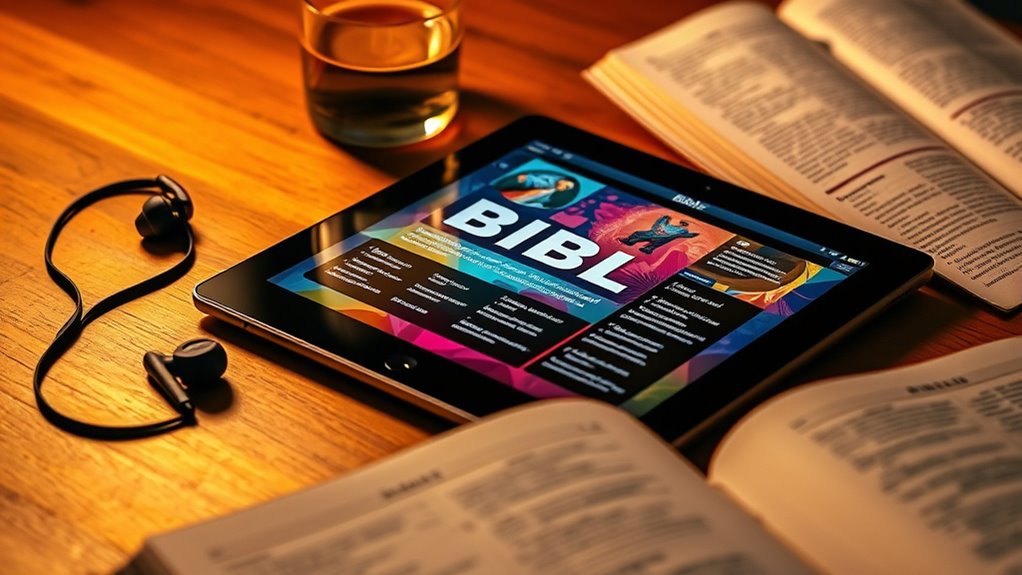To read the Bible in a year, choose a structured plan that suits your schedule, whether daily or weekly, and pick translations that resonate with you. Set realistic goals and dedicate a consistent time each day, creating a distraction-free routine. Use multiple versions for better understanding, journal insights, and track your progress with digital tools or milestones. Stay flexible, adjust when needed, and keep your focus on connecting spiritually—if you continue, you’ll discover more ways to make this journey meaningful.
Key Takeaways
- Choose a suitable Bible reading plan that aligns with your schedule and spiritual goals.
- Set realistic daily reading goals and establish a consistent routine at a specific time each day.
- Use multiple versions and reflection techniques like journaling to deepen understanding and engagement.
- Utilize digital tools and progress tracking to stay motivated and celebrate milestones.
- Maintain flexibility, adjusting your schedule as needed to ensure a meaningful and sustainable reading experience.
Choose a Suitable Reading Plan

Choosing the right reading plan is essential to successfully read the Bible in a year. Start by choosing translations that resonate with you and are easy to understand, making your daily reading more engaging. Consider different versions, like NIV or ESV, to find what fits your style. Once you’ve selected your translation, creating schedules helps keep you on track. Decide whether you want to read a few chapters daily or spread out readings across the week, tailoring it to your lifestyle. Some plans alternate Old and New testament passages, while others follow chronological order. The key is finding a plan that fits your routine and keeps you motivated. With a clear plan in place, you’ll stay committed and experience the full depth of the Bible over the year.
Set Realistic Daily Goals

To stay on track, you need to set daily reading goals that are achievable. Decide how much you can comfortably read each day, and use a plan to guide you. Remember to adjust your goals on busy days so you don’t get discouraged.
Determine Daily Reading Amount
Setting a realistic daily reading goal is essential to stay consistent and avoid feeling overwhelmed. To determine your amount, consider your reading speed and use comprehension techniques to maximize understanding. Break down the Bible into manageable sections, so daily goals feel achievable. Keep in mind:
- Adjust your reading amount based on your daily schedule
- Focus on quality, not just quantity, to deepen understanding
- Use comprehension techniques like note-taking or summarizing to retain key lessons
Use a Reading Plan
Implementing a structured reading plan helps you stay on track and meet your daily goals consistently. By using a plan, you can balance meditative reading with theological study, guaranteeing a meaningful engagement with Scripture each day. Choose a plan that breaks the Bible into manageable sections, aligning with your schedule and reading pace. This approach keeps you focused and motivated, preventing overwhelm. Setting realistic daily goals ensures you maintain steady progress without feeling rushed or discouraged. As you follow your plan, take time to reflect and meditate on passages, deepening your understanding and connection. A well-designed plan makes reading the Bible in a year achievable, enriching your spiritual growth through consistent, intentional effort.
Adjust for Busy Days
When days become unexpectedly busy, it’s important to adjust your Bible reading goals accordingly. Practicing good time management and spiritual flexibility helps you stay consistent without feeling overwhelmed. If you miss a day or fall behind, don’t stress—simply modify your plan. Here are some tips to help:
- Break readings into smaller sections to fit into short time slots
- Prioritize key passages or devotional moments over lengthy readings
- Use audio Bible apps to listen during commutes or chores
Dedicate a Consistent Time for Reading

To stay on track, you need to establish a daily routine for reading the Bible. Choose a specific time each day that fits your schedule and adhere to it consistently. This helps make your reading habit automatic and ensures you don’t miss a day.
Establish Daily Routine
Choosing a specific time each day to read your Bible helps turn it into a consistent habit. When you establish a routine, it becomes easier to stay committed and avoid skipping days. To deepen your practice, incorporate meditation techniques and prayer routines into your schedule. These practices can help you focus and reflect more meaningfully on Scripture. Consider the following tips:
- Pick a time when you’re least likely to be distracted, like early morning or late evening
- Use meditation techniques to prepare your mind for reading and reflection
- Integrate prayer routines before or after reading to seek guidance and gratitude
Set Specific Time
Dedicating a specific time each day for Bible reading helps you build consistency and makes it easier to stay committed. By setting aside a fixed moment, you improve your time management and reinforce your spiritual discipline. Choose a time when you’re most alert and least likely to be interrupted, whether morning, lunch break, or evening. Consistency is key; it transforms reading from a task into a daily habit. When you assign a specific time, it becomes part of your routine, reducing the chance of skipping days. Remember, the goal is progress, not perfection. Regularly dedicating this time helps you stay focused, deepen your understanding, and develop a meaningful connection with Scripture throughout your year-long journey.
Use Multiple Translation Versions for Better Understanding

Using multiple Bible translations can substantially deepen your understanding of Scripture. By comparing different versions, you gain insights into nuances you might miss with only one translation. Exploring translation comparison helps clarify difficult passages, especially when language diversity influences word choices. This approach reveals how various translations interpret key concepts, enriching your study. To maximize this benefit, consider these strategies:
Comparing Bible translations deepens understanding and clarifies difficult passages.
- Use translations rooted in different translation philosophies, like formal and dynamic equivalence
- Focus on versions that highlight language nuances and historical context
- Cross-reference passages in multiple translations for clarity and deeper insight
This method not only broadens your perspective but also enhances your grasp of the Bible’s message, making your year-long reading more meaningful and insightful.
Incorporate Journaling and Reflection

Incorporating journaling and reflection into your Bible reading routine transforms passive reading into an active spiritual practice. As you read, take time to jot down insights, questions, and feelings. This habit deepens your understanding and encourages personal growth by making Scripture more meaningful. Reflection helps you connect biblical lessons to your daily life, reinforcing spiritual discipline. Writing out your thoughts allows you to recognize patterns, track progress, and identify areas for growth. Over time, journaling becomes a valuable tool to nurture your faith, helping you internalize God’s Word and apply it intentionally. This active approach keeps you engaged, fosters a deeper relationship with God, and makes your year-long journey through the Bible more impactful and transformative.
Join a Group or Find Accountability Partners

Joining a group or finding accountability partners can particularly boost your consistency and motivation as you read through the Bible. With community support, you’re more likely to stay committed and engaged, especially during challenging sections. Accountability partners provide encouragement, help keep you on track, and deepen your understanding through shared insights. When you connect with others, you gain different perspectives and stay motivated to meet your reading goals. Consider joining a Bible study group, finding a prayer partner, or forming a small accountability circle. These relationships foster accountability, provide encouragement during tough days, and make the journey more meaningful. Building this support network ensures you remain consistent and inspired throughout your year-long plan.
Utilize Digital Resources and Audio Bibles

Digital resources and audio Bibles can make your daily Bible reading more flexible and accessible. With digital tools, you can listen to audio resources anytime, whether you’re commuting, exercising, or relaxing at home. These tools often include apps, websites, and podcasts that help you stay consistent and engaged. Audio Bibles bring the text to life with clear narration, making it easier to understand pronunciation and tone. Using these resources allows you to incorporate Bible reading into busy schedules, ensuring you stay on track with your one-year plan. Plus, many digital platforms offer features like bookmarking, highlighting, and note-taking, helping you deepen your understanding. Embracing these tools makes your journey through the Bible more convenient, enjoyable, and sustainable.
Track Your Progress and Celebrate Milestones

Using digital tools to access audio Bibles makes it easier to stay consistent with your reading plan, but tracking your progress adds another layer of motivation. When you track milestones, you see how far you’ve come, boosting your confidence to keep going. Celebrating progress helps reinforce your commitment and makes the journey rewarding. Consider marking each completed section or chapter in a journal or app. Set small goals, like finishing a book or a specific number of days, and reward yourself. You might also share milestones with friends or a community for encouragement.
- Keep a visual chart or checklist of completed readings
- Share your milestones on social media or with a study group
- Reflect on your growth at regular intervals
Stay Flexible and Adjust as Needed

While having a plan is helpful, it’s important to stay flexible and be willing to adjust your schedule as needed. A flexibility mindset allows you to adapt your reading pace when life gets busy or unexpected events arise. Embracing reading adaptability means you don’t have to stick rigidly to a set timeline; instead, focus on consistent progress. If you miss a day or fall behind, don’t get discouraged—simply shift your schedule and keep moving forward. Being open to adjustments helps prevent frustration and keeps your motivation high. Remember, the goal is to deepen your understanding and connection with the Bible, not to complete it at a specific date. Flexibility is key to maintaining a sustainable and enriching reading habit.
Frequently Asked Questions
How Do I Stay Motivated Throughout a Year-Long Reading Plan?
Staying motivated through a year-long reading plan can be tough, but focusing on your spiritual growth helps. Set small, achievable goals and celebrate progress. Find accountability partners to keep you inspired and committed. Remember why you started—your desire for a deeper connection with your faith. Regularly reflect on what you’ve learned, and stay flexible if life gets busy. This keeps your motivation strong and your journey meaningful.
What if I Miss a Day or Fall Behind Schedule?
When life throws you a curveball, remember that “a stitch in time saves nine.” If you miss a day or fall behind, don’t stress—use flexible schedules and accountability partners to catch up. Skip a reading? Revisit it later or combine it with another day’s portion. Staying consistent matters more than perfection, so be kind to yourself and keep moving forward.
How Can I Prevent Reading the Bible From Becoming a Chore?
To prevent reading the Bible from feeling like a chore, focus on making it meaningful. Incorporate Bible journaling and prayerful reflection into your routine, which helps deepen your connection. Instead of rushing through passages, take your time to meditate on verses. This active engagement makes reading more enjoyable, personal, and spiritually enriching, transforming it from a task into a nourishing, daily practice you look forward to.
Are There Specific Resources Recommended for Beginners?
Did you know that 75% of new Bible readers find beginner-friendly guides helpful? For your journey, start with recommended study tools like the YouVersion app or the Bible Project videos, which simplify complex passages. These resources are designed to make your reading easier and more engaging. Using beginner-friendly guides can boost your confidence, helping you stay consistent and enjoy your time exploring the scriptures without feeling overwhelmed.
How Can I Deepen My Understanding Beyond Just Reading?
To deepen your understanding beyond just reading, you can practice Scripture meditation, reflecting thoughtfully on passages to uncover their meaning. Additionally, engaging in theological study helps you explore the broader context and themes. Take notes, ask questions, and discuss insights with others. This active approach transforms your reading into a more meaningful experience, helping you grow spiritually and gain a richer, more nuanced grasp of God’s Word.
Conclusion
Think of your Bible reading journey as exploring a vast, beautiful forest. With a clear map, steady footsteps, and companions by your side, you’ll discover hidden treasures and new paths. Sometimes, the trail may twist or fog in, but staying flexible keeps you moving forward. Embrace each step as part of the adventure, knowing that every day’s effort brings you closer to the heart of the forest—and closer to understanding its greatest secrets.










